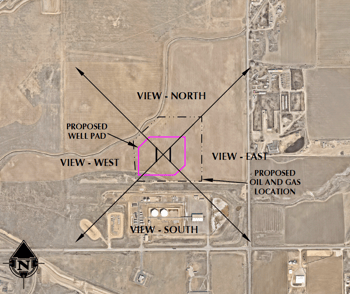Draco Pad
Overview & Location
Extraction Oil & Gas, a wholly owned subsidiary of Civitas Resources, Inc., has received an approved 1041 WOGLA23-0062 from Weld County Oil & Gas Energy Department and an approved OGDP (Form 2A) from the Colorado Energy and Carbon Management Commission (ECMC) for the Draco Pad development. The Draco surface location is planned to be located in the SE4 of Section 21, Township 1 North, Range 68 West, with the intent of accessing minerals Section 19 and 30, of Township 1 North, Range 68 West and in Sections 22, 23, 24, 25, 26 and 27 of 1 North 69 West
Location History
Extraction Oil & Gas, Inc. (Extraction) evaluated 4 alternative locations along with the proposed location. Additionally, Extraction reviewed areas within Boulder County and the Town of Erie and determined that there were no feasible locations that were allowed by local regulations. Extraction ultimately chose the proposed location because it is protective of health and safety, located in a manner to minimize potential nuisances and other impacts to nearby receptors and residents, was clear of any wildlife or environmental concerns.
The proposed location is zoned Agricultural and designated as a LZ-1, recommended default zone for rural low density residential areas, and would have pipeline takeaway for produced water, oil, and natural gas in place. Lastly, the Draco Pad is proximal to existing oil and gas infrastructure with an efficient traffic routing plan and electrical infrastructure that supports the drilling and production phases. As part of the project, 22 legacy vertical wells will be eliminated along with the associated production equipment leading to final reclamation and restoration of sites throughout the community.
Regulatory Permitting Status
Extraction Oil and Gas has received approval from the Colorado Energy & Carbon Management Commission (ECMC)
Notable ECMC Oil and Gas Development Plan process milestones
-
Extraction Oil and Gas has submitted all required forms, exhibits, and plans to the ECMC.
- The ECMC hosted a Public Hearing on October 29, 2024 that provided community members an opportunity to address the commissioners directly.
- Extraction Oil & Gas, Inc's Draco OGDP was heard before the commission on November 13, 2024.
- The Draco Development OGDP hearing was extended to November 15, 2024. At which time the OGDP was continued.
-
Link to the public comment information pamphlet: Info Sheet_303.e.(2).D Public Comment_20210309.pdf (state.co.us)
-
The ECMC heard the Draco Development OGDP at its regular hearing on March 13, 2025.
Weld County 1041 WOGLA Permit Process
Extraction Oil and Gas has received approval from of the 1041WOGLA application from Weld County.
-
Link to the application: Draco Pad - 1041 WOGLA
Current & Future Plans
Civitas permits were reviewed during the first & fourth quarter of 2024, and again during the first quarter of 2025. Upon approval of all the necessary permits, construction of the pad is anticipated to begin during 2nd quarter of 2025 and is expected to take roughly 2 months. Drilling would commence shortly after and may take up to 8 months depending on the number of electric drilling rigs utilized. Once drilling is completed, crews will fracture the wells, another approximate 5-month process that is expected to be completed by summer 2027.
Wells will be completed and prepped for production through 2026, and after a short period of well cleanup, production will begin around the fall of 2026.
Anticipated Timeline
The following timeline intends to inform the sequence and timing of upcoming operations on the Draco Pad. We anticipate a 12-month cycle time from drilling to production. These different stages of the timeline adhere to best-in-class operations and mitigation practices, which are outlined in the timeline details.
Pad Construction scheduled for 2026
This process will include construction of sound walls to minimize disturbance to the surrounding area. The process of constructing the pad and the sound walls is expected to be completed in the 2nd Quarter of 2026.

Drilling Operations Summer 2026
Next we will begin the work to drill the wells. This process will take place in Summer 2026. During this process, we will construct multiple layers of steel and cement casing around each well to ensure wellbore integrity. The drilling rig will be visible and you should expect to see our crews in the area, as well as downcast lighting and additional truck traffic.
Best-in-Class Operations and Mitigation:
The drilling rig(s) that will be utilized to drill the wells to total depth will be powered by utility power. This lowers the emissions and noise levels that are typically associated with this phase of exploration.Extraction will employ pipe cleaning procedures when removing drill string from the well and remove drill cuttings daily. This process
Reduces the potential for odor impacts during the drilling.
Extraction will utilize Group III drilling fluids, Greatly reducing the potential for odor impacts during drilling operations.
Utilize closed-loop, pit-less fluid management system,
greatly reduces odor and emission impacts.

Completions Operations 4th Quarter 2026
Once drilling is complete, the rig will leave the site. We will spend the next thirty days completing each well and preparing to bring them online. This stage should be complete by the 2nd Quarter 2027.
Best-in-Class Operations and Mitigation:

Initial Production 2nd Quarter 2027
We expect to reach the production preparation stage in the 2nd Quarter 2027. During this phase, all excess operational equipment will be removed from the site. Only the wellheads and associated facilities will remain. To ensure safety and environmental compliance, the wells will be monitored 24/7 through automated remote equipment.

Interim Pad Reclamation 3rd Quarter 2027
Once the wells are producing, there will be little to no associated traffic on a day-to-day basis. The pad area will be reduced and the surrounding area will be reclaimed with native vegetation. The wells will continue to produce for up to 30 years. We expect to reach the production stage in the 3rd Quarter 2027.
Best-in-Class Operations and Mitigation:

Note: The times provided are estimates and are subject to local authorization. We will keep you informed of any significant changes to our plans.
22
Wells to be Plugged & Abandoned
18
Existing Locations to be decommissioned and reclaimed
11.8
Total acres to be reclaimed
24
Oil tanks removed
13
Produced Water tanks removed
2652
Number of ANNUAL vehicle trips that will be eliminated due reclamation
4.86
VOC Emissions Reduction (tons/year)
17
Locations w/in 2000' of an RBU
14
Locations w/in 2000' of 10+ RBUs
6
Locations w/in 2000' of School Property
Air Quality – Air Monitoring
Civitas is committed to responsible oil and natural gas production and to finding solutions, making investments, and adopting new technologies to safeguard public health, the environment and quality of life for all Coloradans. As part of this commitment, we are adopting new technology to improve air quality. This includes:
- Deploying real-time, continuous air quality monitors.
- Using a vent-free, fully-enclosed flowback process to capture temporary natural gas emissions coming from a well before it goes into production and directing this gas to a pipeline to be transported offsite, rather than vented or flared, reducing any potential impact on air quality.
In 2017, the Colorado Department of Public Health and Environment (CDPHE) published its review of over 10,000 air measurements of over 50 different oil and gas related volatile organic compounds (VOCS), collected between 350 and 3,700 feet from well pads during different operational phases, and also conducted a review of hundreds of studies looking at associations between oil and gas and health effects. Subsequently, it has collected over 30,000 community air measurements near well pads. The analysis of these tens of thousands of air measurements showed all remain within health guidelines.
Ground Water Protection
The protection of water resources in relation to oil and natural gas development has been studied extensively for decades and is actively regulated by environmental officials at all levels of government. All Civitas projects meet and/or exceed water standards set by the Colorado Oil and Gas Conservation Commission (COGCC). Civitas operates at the highest standards to protect water quality in Arapahoe County and the rest of its operating area.
Prior to drilling, the company measures water tables to monitor impact, then uses a protective casing and cement around wells past the water table. Monitoring wells are tested on a prescribed cycle to ensure local freshwater resources are protected. Water quality is tested prior to drilling to establish a baseline, and monthly testing continues throughout the drilling and completion phase. Finally, Civitas conducts a test six months after production as a last method of verification to ensure the integrity of its operating assets.
The company reduces water use through numerous efforts, including the use of tanks and temporary collapsible water pipelines to minimize unnecessary water evaporation. At sites where water collection infrastructure systems are available, Civitas reverses piped water disposal systems to enable water reuse. When water is disposed, Civitas uses saltwater disposal (SWD) wells provided by a third party.
Consistent with regulatory requirements and industry best practice, Civitas discloses its hydraulic fracturing fluid ingredients at FracFocus.org.



